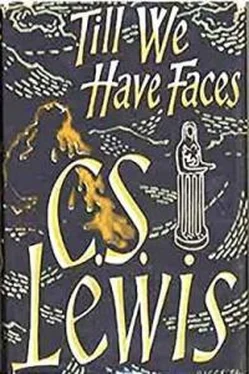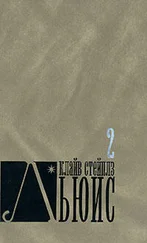These things I heard of from the women as well as from the Fox. When we were alone he told me other news. My father was now, while it lasted, the darling of his people. It seemed (this was how we first came round to the matter nearest our hearts) he had been much pitied and praised at the Great Offering. Up there at the holy Tree he had wailed and wept and torn his robes and embraced Psyche countless times (he had never done it before) but said again and again that he would not withhold his heart’s dearest when the good of the people called for her death. The whole crowd was in tears, as the Fox had been told; he himself, as a slave and an alien, had not been there.
“Did you know, Grandfather,” said I, “that the King was such a mountebank?” (We were talking in Greek of course.)
“Not wholly that, child,” said the Fox. “He believed it while he did it. His tears are no falser—or truer—than Redival’s.”
Then he went on to tell me of the great news from Phars. A fool in the crowd had said the King of Phars had thirteen sons. The truth is he had begotten eight, whereof one died in childhood. The eldest was simple and could never rule, and the King (as some said their laws allowed him) had named Argan, the third, as his successor. And now, it seemed, his second son, Trunia, taking it ill to be put out of the succession—and, doubtless, fomenting some other discontents such as are never far to seek in any land—had risen in rebellion, with a strong following, to recover what he called his right. The upshot was that all Phars was likely to be busy with civil war for a twelvemonth at least, and both parties were already as soft as butter towards Glome, so that we were safe from any threat in that quarter.
A few days later when the Fox was with me (often he could not be, for the King needed him) I said:
“Grandfather, do you still think that Ungit is only lies of poets and priests?”
“Why not, child?”
“If she were indeed a goddess what more could have followed my poor sister’s death than has followed it? All the dangers and plagues that hung over us have been scattered. Why, the wind must have changed the very day after they had——” I found, now, I could not give it a name. The grief was coming back with my strength. So was the Fox’s.
“Cursed chance, cursed chance,” he muttered, his face all screwed up, partly in anger and partly to keep back his tears (Greek men cry easily as women). “It is these chances that nourish the beliefs of barbarians.”
“How often, Grandfather, you have told me there’s no such thing as chance?”
“You’re right. It was an old trick of the tongue. I meant that all these things had no more to do with that murder than with anything else. They and it are all part of the same web, which is called Nature, or the Whole. That south–west wind came over a thousand miles of sea and land. The weather of the whole world would have to have been different from the beginning if that wind was not to blow. It’s all one web; you can’t pick threads out nor put them in.”
“And so,” said I, raising myself on my elbow, “she died to no purpose. If the King had waited a few days later we could have saved her, for all would have begun to go well of itself. And this you call comfort?”
“Not this. Their evil–doing was vain and ignorant, as all evil deeds are. This is our comfort, that the evil was theirs, not hers. They say there was not a tear in her eye, nor did so much as her hand shake, when they put her to the Tree. Not even when they turned away and left her did she cry out. She died full of all things that are really good; courage, and patience, and—and—Aiai! Aiai—oh Psyche, oh my little one——” Then his love got the better of his philosophy and he pulled his mantle over his head and at last, still weeping, left me.
Next day he said, “You saw yesterday, Daughter, how little progress I have made. I began to philosophise too late. You are younger and can go further. To love, and to lose what we love, are equally things appointed for our nature. If we cannot bear the second well, that evil is ours. It did not befall Psyche. If we look at it with reason’s eye and not with our passions, what good that life offers did she not win? Chastity, temperance, prudence, meekness, clemency, valour—and, though fame is froth, yet, if we should reckon it at all, a name that stands with Iphigenia’s and Antigone’s.”
Of course he had long since told me those stories, so often that I had them by heart, mostly in the very words of the poets. Nevertheless, I asked him to tell me them again; chiefly for his sake, for I was now old enough to know that a man (above all, a Greek man) can find comfort in words coming out of his own mouth. But I was glad to hear them too. These were peaceful, familiar things and would keep at bay the great desolation which now, with my returning health, was beginning to mix itself in every thought.
Next day, being then for the first time risen, I said to him, “Grandfather, I have missed being Iphigenia. I can be Antigone.”
“Antigone? How, child?”
“She gave her brother burial. I too—there may be something left. Even the Brute would not eat bones and all. I must go up to the Tree. I will bring it … them … back if I can and burn them rightly. Or, if there’s too much, I’ll bury it up there.”
“It would be pious,” said the Fox. “It would accord with custom, if not with Nature. If you can. It’s late in the year now for going up the Mountain.”
“That’s why it must be done speedily. I think it will be about five–and–twenty days before the earliest snow.”
“If you can, child. You have been very sick.”
“It’s all I can do,” said I.
I was soon able to go about the house and in the gardens again. I did it in some stealth, for the Fox told the King I was still sick. Otherwise he would have had me off to the Pillar Room to work for him. He often asked, “Where’s that girl got to? Does she mean to slug abed for the rest of her life? I’ll not feed drones in my hive for ever.” The loss of Psyche had not at all softened him to Redival and me. Rather, the opposite. “To hear him talk,” said the Fox, “you’d think no father ever loved a child better than he Psyche.” The gods had taken his darling and left him the dross: the young whore (that was Redival) and the hobgoblin (which was I). But I could guess it all without the Fox’s reports to help me.
For my own part, I was busily thinking out how I could make my journey to the Tree on the Mountain and gather whatever might remain of Psyche. I had talked lightly enough of doing this and was determined that I would do it, but the difficulties were very great. I had never been taught to ride any beast, so I must go on foot. I knew it would take a man who knew the way about six hours to go from the palace to the Tree. I, a woman, and one who had to find her way, must allow myself eight at the least. And two more for the work I went to do; and, say, six for the journey home. There were sixteen hours in all. It could not be done in one stitch. I must reckon to lie out a night on the Mountain, and must take food (water I should find) and warm clothing. It could not be done till I recovered my full strength.
And in truth (as I now see) I had the wish to put off my journey as long as I could. Not for any peril or labour it might cost; but because I could see nothing in the whole world for me to do once it was accomplished. As long as this act lay before me, there was, as it were, some barrier between me and the dead desert which the rest of my life must be. Once I had gathered Psyche’s bones, then, it seemed, all that concerned her would be over and done with. Already, even with the great art still ahead, there was flowing in upon me, from the barren years beyond it, a dejection such as I had never conceived. It was not at all like the agonies I had endured before and have endured since. I did not weep nor wring my hands. I was like water put into a bottle and left in a cellar; utterly motionless, never to be drunk, poured out, spilled or shaken. The days were endless. The very shadows seemed nailed to the ground, as if the sun no longer moved.
Читать дальше











